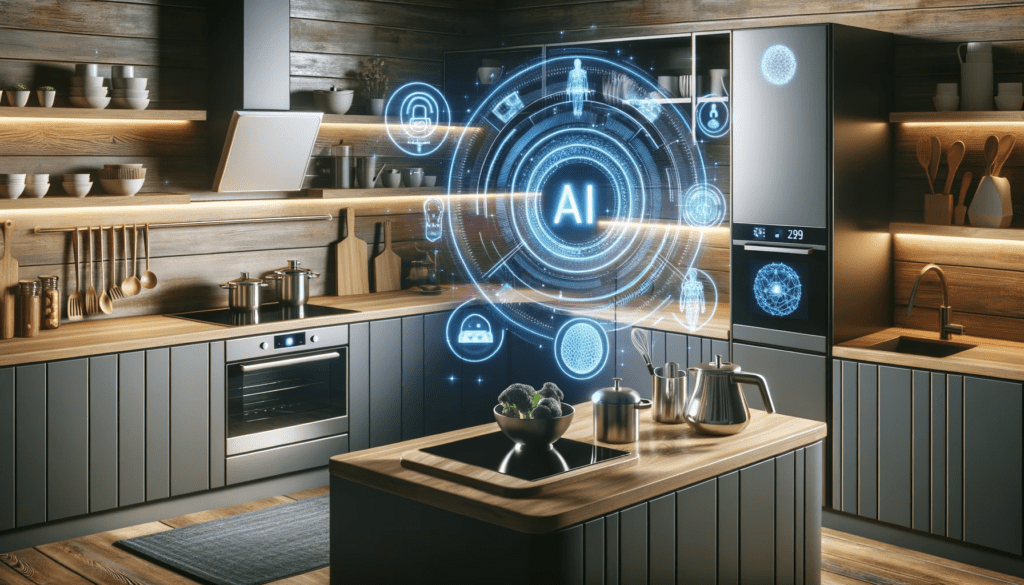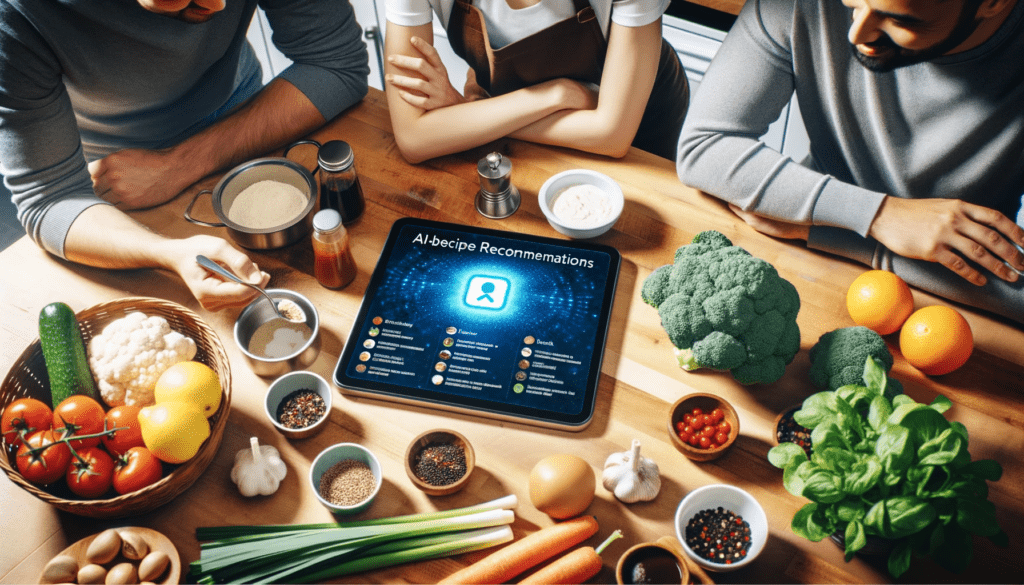Introduction to AI in Smart Kitchens
The rapid advent of Artificial Intelligence (AI) has revolutionized various sectors across the globe, and the culinary domain is no exception. With AI in smart kitchens, a new era of cooking and dining is unfolding right in front of us. Gone are the days when cooking was a labor-intensive routine. Beetles of burnt food or overcooked meals are now relics of the past. Incorporating AI in smart kitchens has resulted in efficiency, accuracy, and a luxurious user experience.
The heart of these advanced culinary solutions lies in smart kitchen technologies that go beyond conventional microwaves and refrigerators. Through AI-powered applications and devices, our kitchens are swiftly turning into personalized cooking assistants, simplifying the complex chore of cooking into a seamless, effortless task. From assisting in meal planning to automating various cooking processes, AI in smart kitchens is swiftly becoming a reality embraced in homes worldwide. By revolutionizing the everyday culinary experience, AI in smart kitchens is taking the art of cooking to unprecedented heights.

Here are some of the ways AI is transforming smart kitchens:
- AI-Powered Cooking Appliances: These appliances can adjust their settings based on what you're cooking. For instance, an AI-enabled oven can automatically set the right temperature and cooking time for a chicken roast or a batch of cookies.
- Smart Refrigerators: Smart refrigerators equipped with AI technology can monitor food inventory, suggest recipes based on available ingredients, alert users when they’re running low on certain items and even place grocery orders online.
- Voice-Controlled Kitchen Assistants: With voice-controlled assistants like Amazon's Alexa or Google Home integrated into your kitchen appliances, you can set timers, control lighting and music, ask for recipe suggestions or nutritional information without lifting a finger.
- Personalized Meal Planning: With access to user’s dietary preferences and health goals, AI-powered apps can create personalized meal plans. They also offer step-by-step instructions to prepare those meals making healthy eating more accessible than ever before.
- Automated Cooking Processes: From precision cookers that ensure perfectly cooked meats every time to coffee makers that brew your morning cup at exactly the right strength and temperature – automated processes powered by AI are taking guesswork out of cooking.
By incorporating these technologies into our everyday lives, we're not just simplifying tasks but also ensuring healthier eating habits and reducing waste significantly. This is how the integration of artificial intelligence in our kitchens holds promise for improving both culinary experiences as well as overall lifestyle.
Smart Appliances and Voice-Control
The advent of AI-powered appliances in the kitchen has truly commenced an era of convenience making manual labor redundant. Envision your refrigerator that not only stores your food but also keeps an inventory, notifies you when you're running low on essentials, and even places orders for you. Imagine your oven adjusting the temperature and time based on the recipe you're cooking. These technologies are edging closer to reality as developments in AI smart kitchens continue.
Furthermore, the integration of voice-activated kitchen devices has escalated the functionality and ease of use, contributing to streamlined and efficient cooking experiences. Devices like Google Home and Amazon's Alexa can lend their assistance in reading out recipes, setting timers and even controlling other connected devices. The capstone of AI smart kitchen is this voice control aspect - allowing users to carry out complex tasks merely through verbal instructions. The fusion of AI-powered appliances and voice-activated technology undoubtedly beacons the future of cooking, where AI smart kitchens will form a ubiquitous concept.

AI-Based Recipe Recommendations
Robotic cooking assistants are now equipped with artificial intelligence to optimize and simplify the cooking process for their users. These smart assistants can generate creative and healthy recipes based on the user's dietary preferences, adding another feature to the list of multifunctional tasks that AI Smart Kitchens can perform. Moreover, these robotic cooking assistants can also comprehend and predict user behavior, intelligently suggesting recipes that will likely be appreciated by the user.
Experimentation and personalization in cooking have also become more convenient and user-friendly with the advent of AI Recipe Recommender Systems in AI Smart Kitchens. Leveraging machine learning and data analysis, these systems can browse through hundreds of thousands of recipes, pick out the ones that suit the user's preferences, and even recommend new, personalized recipes. This seemingly simple function of an AI Smart Kitchen significantly enhances the versatility and functionality of the cooking space, making it an indispensable feature in modern households.
Robotics in Cooking and Cleaning
The advent of AI in the realm of kitchen management has seen remarkable development in intelligent kitchen management. With robotics playing an integral part in transforming the way chores are performed, it's evident that AI has swiftly seeped into the core operations of a modern kitchen. The concept of AI smart kitchen revolves around automated procedures, where devices are AI-integrated to cater to cooking and cleaning tasks. These tasks are often time-consuming and labor-intensive for homeowners. However, with the assistance of robotics in an AI smart kitchen, people can enjoy a hassle-free, efficient, and technologically advanced cooking environment.
On another note, the employment of AI in food waste reduction signifies another major leap in smart kitchen automation. With advancements in AI smart kitchen technologies, robotics are now capable of monitoring and managing food waste effectively. These robots can sort, segregate, and manage waste with precise accuracy, thus playing a pivotal role in reducing food wastage and promoting environmental sustainability. As AI in smart kitchen environments continues to evolve, the integration of robotics in cooking and cleaning reflects a promising trajectory for the future of intelligent kitchen management.

Real-Time Data Analysis for Better Cooking Experience
The Smart Kitchen Market Growth has been significantly boosted by innovations in artificial intelligence. One major attribute of AI that's driving this growth is real-time data analysis. Real-time data interpretation provides home cooks the convenience of fine-tuning their cooking procedures on the fly. For instance, AI-powered ovens can monitor the food inside, adjusting temperature and cooking time according to item weight and type. This ensures optimal cooking conditions and lessens the rate of error, offering a better overall cooking experience.
Robotics in kitchen cleaning also plays its part in enriching our relationship with the kitchen. AI smart kitchen technology now includes robots that can clean up after a meal, minimizing the less savory aspects of cooking. Furthermore, AI integrated systems can learn and adapt to a user's cooking habits then offer suggestions for improvement. Possible safety risks can also be pinpointed in real time, allowing individuals to rectify potentially hazardous situations instantly. Ultimately, the goal is to create a seamless, enjoyable cooking experience casual and gourmet cooks alike can appreciate.
AI and IoT: Revolutionizing Cooking and Dining
The influx of AI and IoT technology into our daily lives has brought about a significant shift in consumer behavior, aiding in the quick consumer adoption of smart kitchens. This technology does more than just facilitate our lives; it changes the meaning of cooking and dining in today's high-tech world. Within the smart kitchen context, AI provides unprecedented comfort by enabling kitchen appliances to "learn" from users' patterns and preferences. For instance, your coffee machine can remember your preferred coffee strength and have it ready exactly when you usually wake up.
The interconnectedness fostered by IoT in an AI smart kitchen creates a harmonious relationship between various appliances, providing a seamless cooking experience from kitchen to table. Leveraging real-time data from these appliances, artificial intelligence can optimize cooking times, suggest meal options, or remind you when you're running low on your favourite ingredients. The numerous conveniences that come along with an AI smart kitchen not only make home cooking effortless but also make it a thoroughly enjoyable experience. As the AI smart kitchen continually evolves, consumer adoption of smart kitchens is expected to rise, advancing the revolution in cooking and dining.
Future Innovations in AI-Powered Kitchens
The realm of AI smart kitchens is ripe for future innovations. As technology advances, we can envisage an AI-controlled kitchen that is both energy-efficient and helps reduce food waste. Imagine a fridge that can monitor and predict the expiry dates of food and alert users in advance, thus negating unnecessary wastage. Or a smart oven that adjusts heat levels based on what's being cooked, preventing under or overcooking your food.
Incorporating AI into the kitchen design is just the beginning. We can expect AI smart kitchens to be enhanced with even greater personalized features, streamlining the cooking experience to cater to individual preferences. Picture an AI culinary assistant that not only suggests recipes based on ingredients in your pantry but also takes into account your dietary preferences or health requirements. These future innovations in AI smart kitchens will no doubt revolutionize our cooking and dining experiences, transforming them into a seamless part of daily life.

Cost and Accessibility
The field of AI in smart kitchens is rapidly developing, but many are wondering about its cost and accessibility. To incorporate AI in a normal kitchen at its most basic level, significant investment is needed. However, the costs are projected to decrease as technology progresses and becomes more commonplace. Also, many manufacturers of smart appliances have plans to introduce more affordable options in the near future, while ensuring the high quality and efficiency that AI smart kitchens promise.
Accessibility is another crucial factor when considering AI smart kitchens. Although the use of this high-tech equipment may seem daunting to those unfamiliar with AI, manufacturers are going the extra mile to ensure their devices are user-friendly. These AI smart kitchen appliances are being designed with intuitive controls and easy-to-use interfaces, thus lowering the threshold. As such, people without advanced technical knowledge will be able to navigate through the functionalities effortlessly. Additional support and training solutions are also being considered to ensure all users can fully enjoy the benefits of their AI smart kitchen.
Consumer and Industry Response
The proliferation of AI smart kitchen technologies has elicited a diverse response from both consumers and industry insiders alike. Many consumers are fully embracing the conveniences and added luxuries of utilizing a smart kitchen. They are praising the dramatic simplification of cooking and meal planning processes. AI smart kitchen appliances, through intelligent recipe recommendations based on available ingredients and personal preferences, have revolutionized the average household’s dining experience. Furthermore, drastic reductions in food waste, and more efficient use of energy due to these technologies are also appealing aspects encouraging consumers to advocate for AI smart kitchens.
Similarly, the industry response to AI smart kitchens has been overwhelmingly positive with manufacturers, innovators and technological giants throwing their full support behind it. The integration of artificial intelligence into kitchens is seen as the next big frontier in home-related tech innovation. The prospect of having digital assistants, AI-powered cookware, automated cleaning robots, all working in unison in a smart kitchen, is appealing not just for tech-savvies but also for the companies who stand to benefit from an ever-growing market. The combination of AI and IoT in smart kitchens has opened up huge potential avenues for future advancements, attracting substantial interest and investment from industry thought-leaders.
The integration of Artificial Intelligence continues to introduce noteworthy revolutions in diverse sectors, and the kitchen is no exception. AI in smart kitchens technology is innovatively transforming everyday kitchen activities into an experience worth looking forward to. With AI smart kitchen appliances, one is able to enjoy a simplified cooking process, saving both time and energy. In addition, the AI smart kitchen also proposes an elevated dining experience through real-time data analysis. This way, meals are not only efficiently prepared but also healthily balanced.
AI is inherently dynamic, allowing for constant software updates and consequently, an ever-improving AI in smart kitchens experience. The fusion of AI and IoT is creating an incredibly convenient and efficient cooking environment. This is characterized by voice-controlled appliances, AI-based recipe recommendations, and additionally, robotics for cooking and cleaning. Notably, the AI smart kitchen showcases significantly promising potential for future innovations. It's indeed an exciting, transformative journey for those engaging with the AI in smart kitchens.
What are the benefits of AI in reducing food waste in smart kitchens?
AI can significantly reduce food waste in smart kitchens by tracking and managing inventory, predicting expiry of food items, and suggesting recipes based on available ingredients. This not only helps to reduce waste but also promotes efficient use of resources.
How is robotics transforming cooking in smart kitchens?
Robotics is revolutionizing the cooking process in smart kitchens. From automated cooking appliances that can stir, mix, or even bake to robotic arms that can mimic human-like cooking actions, these innovations can prepare meals with precision and consistency, reducing human effort and errors.
How have consumers responded to AI-powered smart kitchen appliances?
Consumers have generally responded positively to AI-powered smart kitchen appliances. They appreciate the convenience, efficiency, and enhanced functionality these appliances bring. However, some consumers express concerns about cost, privacy, and the learning curve involved in using these high-tech devices.
What are the market growth predictions for AI-enabled smart kitchens?
The market for AI-enabled smart kitchens is predicted to witness significant growth in the coming years. This is attributed to increasing consumer demand for convenience and efficiency in the kitchen, coupled with advancements in AI and IoT technology.
How can voice-controlled smart appliances enhance modern kitchens?
Voice-controlled smart appliances can make modern kitchens more user-friendly and efficient. They allow for hands-free operation, which can be particularly useful while cooking or cleaning. Furthermore, they can perform tasks such as preheating the oven or adjusting the temperature based on voice commands, saving time and effort.
How can AI and robotics reduce cooking time in kitchens?
AI and robotics can streamline the cooking process and reduce cooking time significantly. They can automate repetitive tasks, maintain optimal cooking temperatures, and even prepare meals autonomously which greatly reduces the time and effort involved in cooking.
How can integrating AI and IoT create a seamless kitchen experience?
Integrating AI and IoT can revolutionize the kitchen experience by creating a connected ecosystem of appliances that communicate with each other and automate various tasks. This can lead to increased efficiency, convenience, and a personalized cooking and dining experience.
What is the cost analysis of implementing AI technologies in kitchens?
Implementing AI technologies in kitchens can be costly initially due to the high price of smart appliances. However, over time, these technologies can lead to cost savings by improving efficiency, reducing waste, and lowering energy consumption.
What future innovations are anticipated in robotic cooking and cleaning systems?
Future innovations in robotic cooking and cleaning systems could include advanced AI algorithms for more complex cooking tasks, improved sensory perception for precise ingredient measurement and manipulation, and increased integration with other smart home systems.
How can AI and smart technologies enhance the dining experience?
AI and smart technologies can enhance the dining experience by providing personalized recipe recommendations, adjusting cooking processes based on individual preferences, and creating an engaging, interactive dining environment. Furthermore, they can also enable remote control of kitchen appliances, providing a more convenient and comfortable dining experience.




